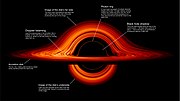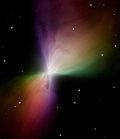Herbig–Haro (HH) objects are bright patches of nebulosity associated with newborn stars. They are formed when narrow jets of partially ionised gas ejected...
36 KB (4,004 words) - 16:10, 8 November 2024
for his contribution to the discovery of Herbig–Haro objects. Born in 1920 in Wheeling, West Virginia, Herbig received his Doctor of Philosophy in 1948...
7 KB (537 words) - 23:49, 15 June 2024
contribution to the discovery of Herbig–Haro objects. Haro was born in Mexico City on 21 March 1913 to Ignacio Haro and Leonor Barraza. He studied philosophy...
11 KB (963 words) - 08:39, 13 September 2024
Brown dwarf (category Substellar objects)
is only one known proto-brown dwarf that is connected with a large Herbig–Haro object. This is the brown dwarf Mayrit 1701117, which is surrounded by a...
162 KB (17,784 words) - 07:01, 29 October 2024
that some Bok globules contain embedded warm sources, some contain Herbig–Haro objects, and some show outflows of molecular gas. Millimeter-wave emission...
9 KB (847 words) - 21:45, 29 August 2024
HH 46/47 (redirect from Herbig-Haro 46/47)
HH 46/47 is a complex of Herbig–Haro objects (HH objects), located around 450 parsecs (about 1,470 light-years) away in a Bok globule near the Gum nebula...
15 KB (1,714 words) - 18:42, 19 March 2024
HH 24-26 (category Herbig–Haro objects)
24-26 is a molecular cloud and star-forming region containing the Herbig-Haro objects HH 24, HH 25 and HH 26. This region contains the highest concentration...
5 KB (443 words) - 19:25, 9 March 2024
blood type Henderson–Hasselbalch equation, in biology and chemistry Herbig–Haro object, in astronomy Hitchhiker Program, a NASA program established in 1984...
2 KB (368 words) - 23:27, 23 October 2024
HH 1/2 (category Herbig–Haro objects)
Herbig-Haro objects HH 1/2 are the first such objects to be recognized as Herbig-Haro objects and were discovered by George Herbig and Guillermo Haro...
8 KB (850 words) - 15:15, 20 January 2024
emission (2004). Protostar outburst - HOPS 383 (2015). Protostar in Herbig-Haro 46/47. A protostar inside a Bok globule (Artist's image). Stellar cluster...
11 KB (1,238 words) - 17:40, 18 June 2024
In astronomy, the term compact object (or compact star) refers collectively to white dwarfs, neutron stars, and black holes. It could also include exotic...
20 KB (2,582 words) - 02:09, 21 June 2024
Star formation (section Notable pathfinder objects)
onto the protostar. In this stage bipolar jets are produced called Herbig–Haro objects. This is probably the means by which excess angular momentum of the...
48 KB (5,543 words) - 03:22, 13 October 2024
transition-disk objects. YSOs are also associated with early star evolution phenomena: jets and bipolar outflows, masers, Herbig–Haro objects, and protoplanetary...
5 KB (612 words) - 14:41, 22 May 2024
Disrupted planet Exoasteroid Formation and evolution of the Solar System Herbig–Haro object Nebular hypothesis Q-PACE, a spacecraft mission to study accretion...
21 KB (2,138 words) - 13:56, 3 September 2024
solar masses)—A and B spectral type pre–main-sequence stars, are called Herbig Ae/Be-type stars. More massive (>8 solar masses) stars in pre–main sequence...
9 KB (928 words) - 20:03, 20 March 2024
sequence stage. An observed PMS object can either be a T Tauri star, if it has fewer than 2 solar masses (M☉), or else a Herbig Ae/Be star, if it has 2 to...
4 KB (481 words) - 02:20, 30 August 2024
A Herbig Ae/Be star (HAeBe) is a pre-main-sequence star – a young (<10 Myr) star of spectral types A or B. These stars are still embedded in gas-dust envelopes...
5 KB (567 words) - 21:27, 12 September 2022
above NGC 1999 HH 34 a Herbig–Haro object with symmetric bow shocks LDN 1641 HH 1/2, the first recognized Herbig–Haro objects Orion B molecular cloud...
14 KB (1,568 words) - 00:12, 17 June 2024
accretion disk forms instead. Accretion disks surrounding T Tauri stars or Herbig stars are called protoplanetary disks because they are thought to be the...
33 KB (4,352 words) - 06:19, 17 September 2024
collapsing star and result in small patches of nebulosity known as Herbig–Haro objects. These jets, in combination with radiation from nearby massive stars...
147 KB (16,417 words) - 22:09, 6 November 2024
Corona Australis (section Deep sky objects)
the constellation border with Sagittarius. It contains 7000 M☉, Herbig–Haro objects (protostars) and some very young stars, being one of the closest...
52 KB (4,974 words) - 08:37, 18 August 2024
Messier 78 (redirect from Messier Object 78)
in the process of formation, are members as well. Similarly, 17 Herbig–Haro objects are known in M78. On May 23, 2024, the European Space Agency released...
7 KB (614 words) - 11:00, 18 July 2024
Pelican Nebula (category IC objects)
still remain, and among these are found two jets emitted from the Herbig–Haro object 555. Millions of years from now this nebula might no longer be known...
4 KB (292 words) - 15:19, 7 September 2024
in the sky Accretion disk Bipolar outflow Blandford–Znajek process Herbig–Haro object Penrose process CGCG 049-033, elliptical galaxy located 600 million...
16 KB (1,684 words) - 21:19, 1 October 2024
HL Tauri (category Objects with variable star designations)
of planets in the process of formation. It is accompanied by the Herbig–Haro object HH 150, a jet of gas emitted along the rotational axis of the disk...
12 KB (1,196 words) - 07:11, 7 October 2024
media related to Herbig-Haro objects. A General Catalogue of Herbig–Haro Objects A Catalogue of Molecular Hydrogen Emission-Line Objects in Outflows from...
8 KB (1,012 words) - 15:09, 17 July 2024
Solar System (section Extreme trans-Neptunian objects)
The Solar System is the gravitationally bound system of the Sun and the objects that orbit it. It formed about 4.6 billion years ago when a dense region...
222 KB (21,885 words) - 00:25, 4 November 2024
or 80 times the mass of Jupiter. Below this threshold are sub-stellar objects that can not sustain hydrogen fusion, known as brown dwarfs. Because there...
61 KB (6,826 words) - 12:04, 23 September 2024
A Thorne–Żytkow object (TŻO or TZO), also known as a hybrid star, is a conjectured type of star wherein a red giant or red supergiant contains a neutron...
17 KB (1,689 words) - 05:21, 22 October 2024
been applied to hypothetical late-stage cooled brown dwarfs – substellar objects with insufficient mass (less than approximately 0.07 M☉) to maintain hydrogen-burning...
10 KB (1,142 words) - 05:00, 25 July 2024






















